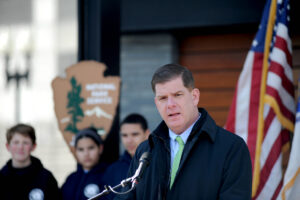Election 2020: The October 15th Debate
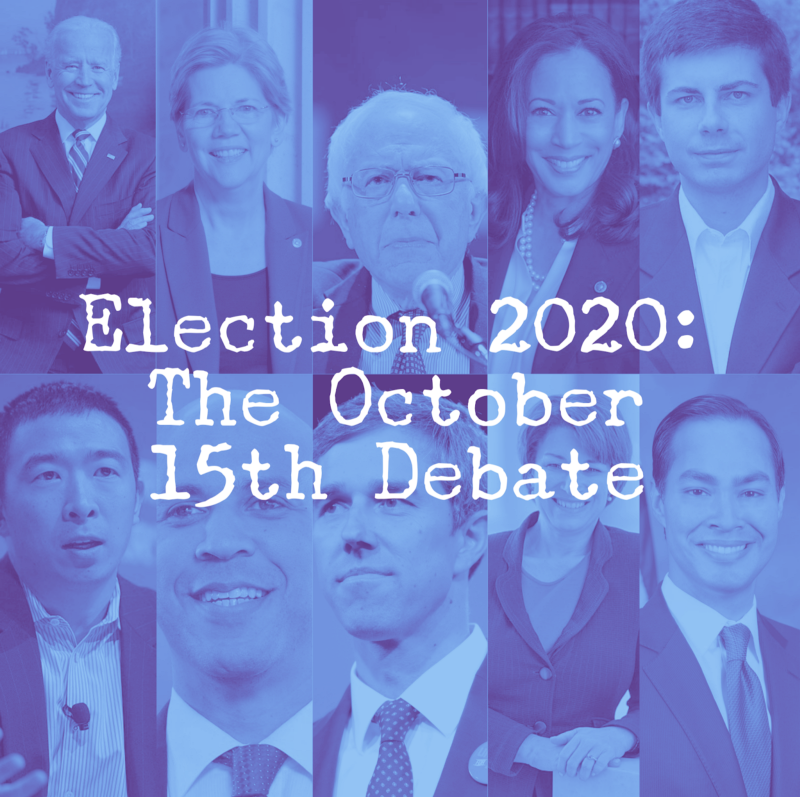
Previous Debates: June 26 | June 27 | July 30 | July 31 | September 12
With just over three months to go until the Iowa Caucus, the Democratic Primary field has remained contentious. Just last week, Massachusetts Senator Elizabeth Warren took a brief lead in the polls, for the first time since Vice President Joe Biden entered the race. This was spurred in part by a scandal that ensnared the former vice president surrounding his son’s relationship with an oil company in the Ukraine. On top of this, Vermont Senator Bernie Sanders suffered a heart attack, New York Mayor Bill de Blasio dropped out of the race, and Hawaii Congresswoman Tulsi Gabbard qualified for the debate. Billionaire Tom Steyer, who entered the race shortly after the first debate, will also be joining the stage for the first time this season.
Tonight is the October debate. Similar to September, the event will be a single night with the twelve candidates who qualified. To qualify for this debate, candidates had to reach one percent support in four separate polls and meet a grassroots fundraising threshold of 130,000 people (with a floor of 400 unique donors) in at least 20 states. If more than 20 candidates met at least these criteria, the DNC would give preference to candidates with higher polling and donor numbers.
The following candidate list is for the October 15th debate. All poll numbers are from RealClearPolitics as of Sunday, October 13, 2019.
Joe Biden (29.4%)
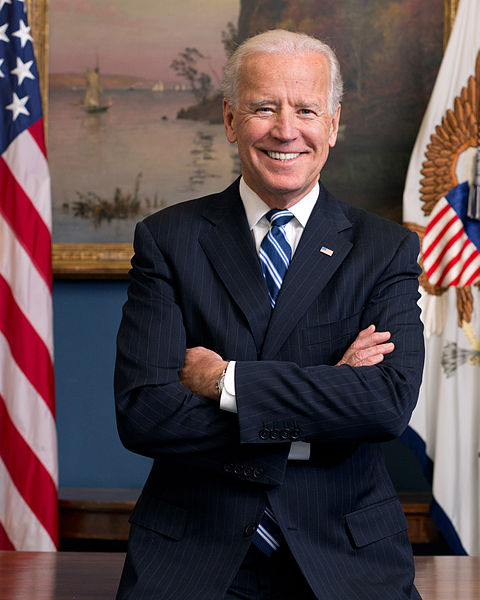
Former Vice President Joe Biden has had a bit of a rough month. He’s been slowly losing his polling lead to Massachusetts Senator Elizabeth Warren. President Trump has been coming down on him, risking impeachment to investigate the former Delaware senator’s ties to an oil company in the Ukraine via his son, Hunter. Will Vice President Biden be taken down by the incumbent president’s attempts to “drain the swamp”? Or will he weather the storm and make it through to the Convention? Either way, changing his stance on impeachment probably does little to address those concerns.
Since September, the former vice president has released a $750 billion plan to address federal student loans — the “Biden Plan for Education Beyond High School”. Biden’s plan is income-based (with an option to opt out), exempting all undergraduate student loan debt for those making less than $25,000 a year and charge only 5% of discretionary income for those making over $25k. After 20 years of repayment, the remainder of the debt would be forgiven and would not be subject to income tax. The former Delaware Senator also proposes a program for public servants for $10,000 of student loan debt relief for each year of national or community service (for up to five years). This program would be retroactive, allowing prior years of service to be applied.
Cory Booker (1.6%)
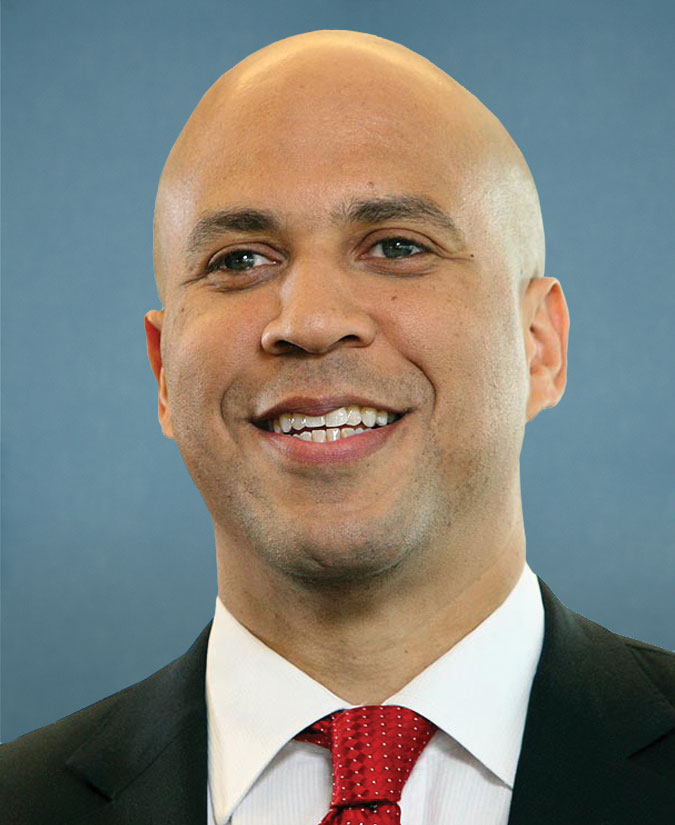
After a bit of a rough patch, New Jersey Senator Cory Booker seemed to regain some steam going into the last debate. He had performed rather well in September, but has been relatively quiet over the last two weeks. Allegedly, he almost dropped out of the race before meeting a self-imposed fundraising deadline for the third quarter. Still, he’s remained politically relevant enough to qualify for both tonight’s debate and the one in November, so he’s got the luxury of time if he intends to do more than PDA with Rosario Dawson on the red carpet.
Since September, the former Newark mayor released two plans, aimed at combating child poverty and compensating college athletes, respectively. Regarding the poverty plan, Booker proposes restoring funding for the Temporary Assistance for Needy Families program to 1996 levels (adjusted for inflation), aiming the funds at impoverished children and families, and spending to help educate and/or train adult members of families. The campaign estimates this would help lift over 7 million children out of poverty, combined with Booker’s previously proposed methods. Regarding college athletes, the senator intends to allow them to be compensated for their “name, image and likeness”; provide medical coverage for up to ten years after eligibility; provide “lifetime scholarships” after two years of completion on their teams; and strengthen Title IX and gender pay equity — including for minor league athletes, cheerleaders, and dancers.
Pete Buttigieg (5.2%)
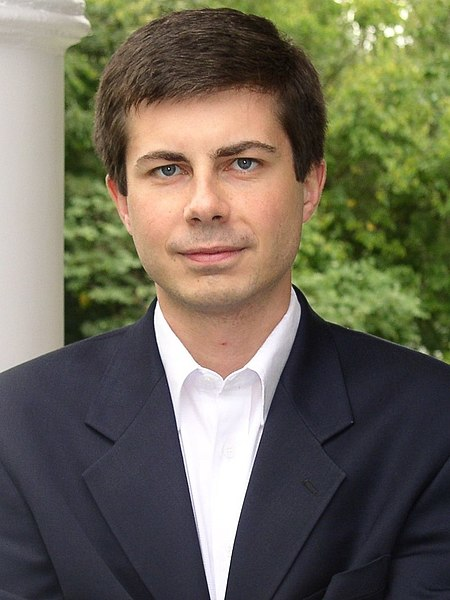
Mayor Pete Buttigieg of South Bend, Indiana, has remained a top-five candidate despite inconsistent debate performances. Something about the format does not seem to translate well for him, but he makes up for those losses in his campaign events and interviews. As such, he has remained one of the top fundraisers in the Democratic field, pre-qualifying for the November debate. With the potential implosion of the Biden campaign, and the continued failure of former Texas Representative Beto O’Rourke, Buttigieg seems to be positioning himself as the moderate counterpoint to front-runners Warren and Sanders. I’m skeptical it will work, but raising $19.1 million for a candidate with single-digit polling is no joke, so I could be dead wrong.
Since September, the South Bend mayor has released the “Affordable Medicine for All” plan aimed at reducing prescription drug costs and “[boosting] medical innovation”. Buttigieg proposes letting the government negotiate drug prices, capping drug prices ($200 for seniors, $250 for “Medicare for All Who Want It” enrollees), and charging non-compliant pharmaceuticals a 65% tax on gross sales. While the company is out of compliance, this tax will increase by 10% each quarter, up to 95%. The South Bend native has also outlined his agenda for LGBTQ+ Americans (“Becoming Whole: A New Era for LGBTQ+ Americans”) which includes anti-employment discrimination legislation (including veterans), banning certain surgeries on intersex children, and adding non-binary gender options to passports.
Julián Castro (1.0%)
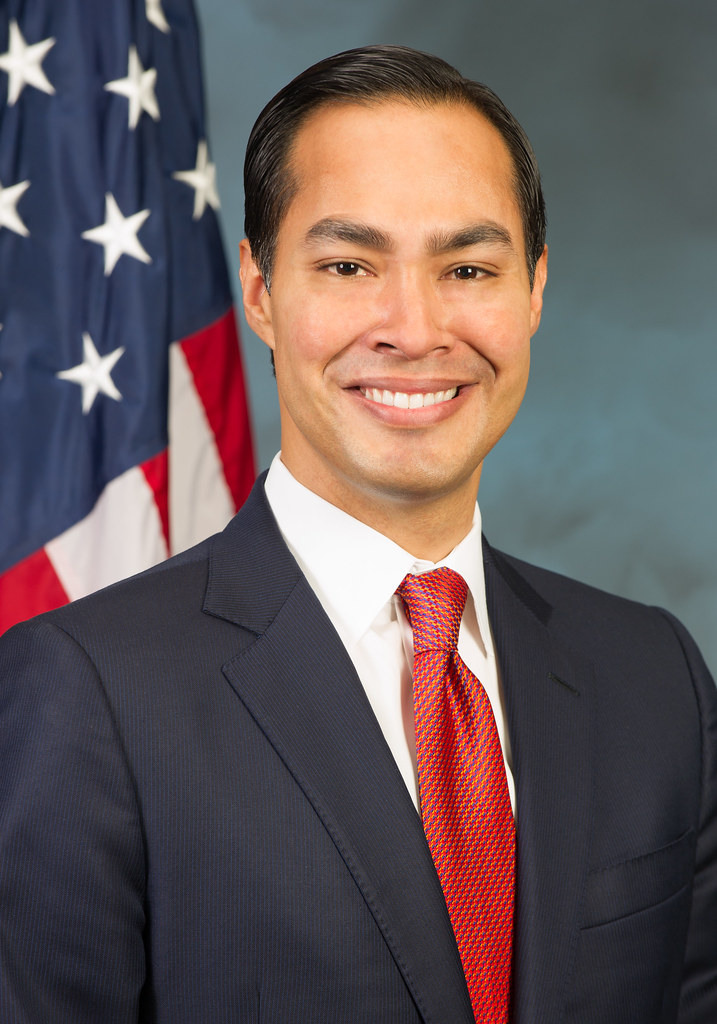
Former HUD Secretary Julián Castro is in a bit of a pickle. Many folks, both Democrats and Republicans, felt that his treatment of former Vice President Biden in the September debate was in poor taste. Rather than simply attacking policy positions, he attacked his fellow Obama Administration colleague on his memory and claimed to be doing a better job of carrying on the legacy of their former boss.
Since September, the former San Antonio mayor has been on the campaign trail. While not releasing any new policy positions of substance, Secretary Castro was seen escorting asylum seekers, some of whom were disabled or LGBTQ+, across the border into Texas. He also released a list of endorsements just yesterday, because that’s what’s going to rescue his campaign, right?
Tulsi Gabbard (0.8%)
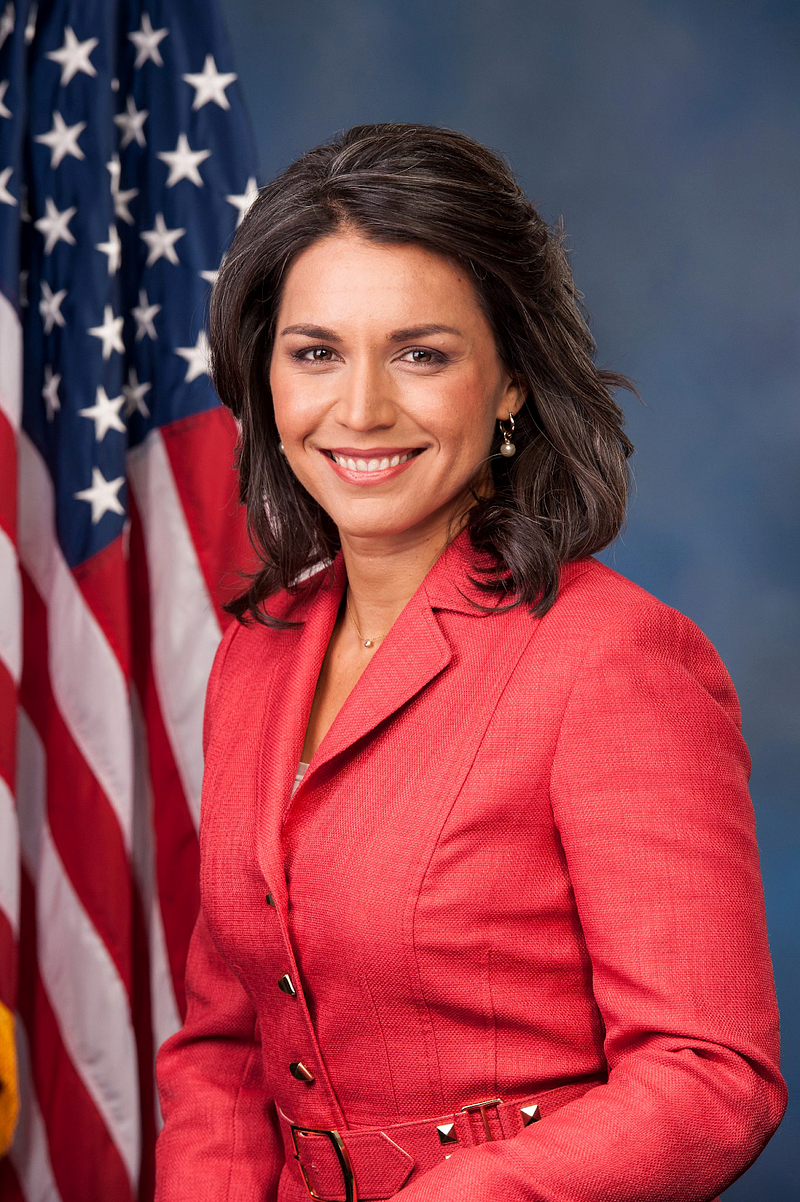
After missing the September debate, Hawaii Congresswoman Tulsi Gabbard is back on stage and ready to hit the ground running. She’s been a more moderate Democrat, one of the few who did not immediately support impeachment of President Trump (although she’s recently had a change of heart). While she’s been painted as a conservative voice in the Democratic race, and has even lent her voice to conservative outlets, the Hawaii congresswoman is largely in line with her progressive colleagues. She’s just avoided “Trump derangement syndrome,” and prefers not to jump to conclusions on any given issue. Truthfully, we could all learn a lot from her, but she’s probably not going to be in the race much longer.
Case and point: Congresswoman Gabbard spent the majority of the past month simply trying to qualify for tonight’s debate. She has not released any new policy platforms of note, despite calling for a foreign policy-focused night. Gabbard even threatened to boycott tonight before backing away from that position. Whatever she was planning for her campaign may have to wait until 2024. Or maybe she’ll turn third party?
Kamala Harris (5.2%)
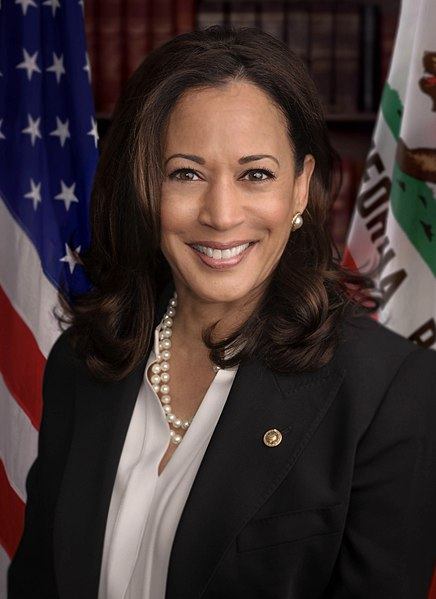
Senator Kamala Harris seems to be in constant free fall. Her poll numbers have never fully recovered from the second debate, largely signaling that her campaign was unprepared for the swift rise in status and fumbled the opportunity. Still, she’s qualified for the November debate, so she’s got time to recover, and she’s been banking on the state of Iowa. Will it work out?
Since September, the California junior senator has released her “Children’s Agenda” during her campaign in Iowa. This plan proposes six months of paid leave for all workers — full-time, part-time, self-employed, and independent contractors alike. It would also allow workers making less than $75,000 a year to receive full wages during leave. Harris also proposed creating an Office of Paid Family and Medical Leave.
Amy Klobuchar (1.3%)
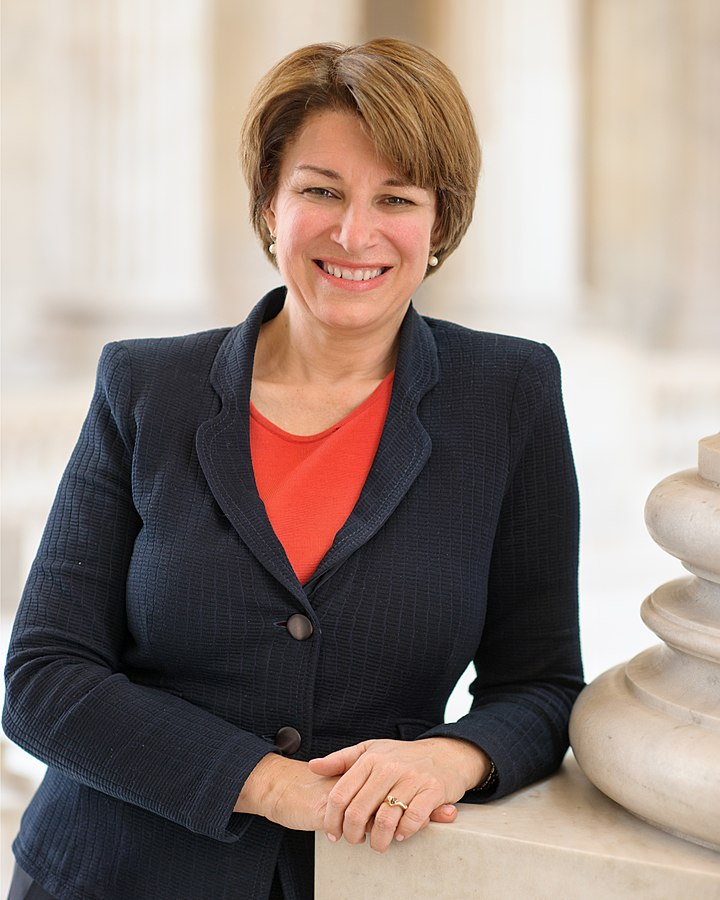
Minnesota Senator Amy Klobuchar is another moderate candidate struggling to stay in the race. While she remains one of the most popular senators in the country, she has yet to consistently maintain a polling average above 2%.
Since September, Senator Klobuchar has a veteran “plan”; I put this in quotation marks because, per the New Hampshire Union Leader, her plan is largely made up of legislation she has previously sponsored in Congress. It mostly advocates for increasing investment in Veterans Affairs services, which would ideally improve housing, mental health, and job training services on top of regular medical care.
Beto O’Rourke (2.6%)
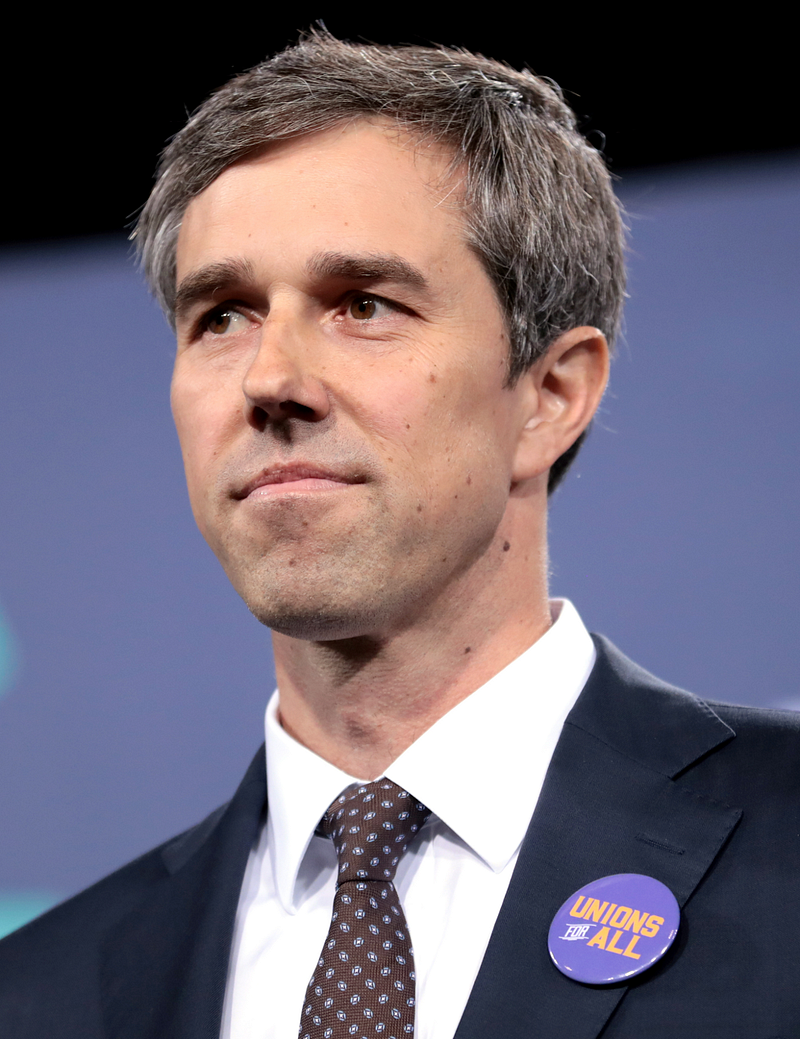
It is no secret that I’ve been skeptical of former Texas representative Robert “Beto” O’Rourke from the jump. He’s had very low polling, very obvious pandering, and weak debate performances. He’s also staking his presidential campaign on his failed Senate campaign. That being said, his campaign has not completely fizzled out just yet. He gave arguably his strongest debate performance last month, and has seemed to have been inspired by the El Paso shooting to take gun control as the signature issue of his campaign. Simply having an identity may be enough to garner more support in the long run.
Since September, Congressman O’Rourke released two plans, one aimed at gender equality and the other at affordable housing. On gender equality, the former Texas representative proposes workplace protections for pregnant women, civil rights protections for transgender women, and protections for abortions. Regarding affordable housing, O’Rourke proposes investing $400 billion into the National Housing Trust Fund over ten years in an effort to create three million homes. He also proposes a $60 billion grant program over ten years for another three million homes, and $50 billion to refresh current public housing.
Bernie Sanders (15.6%)
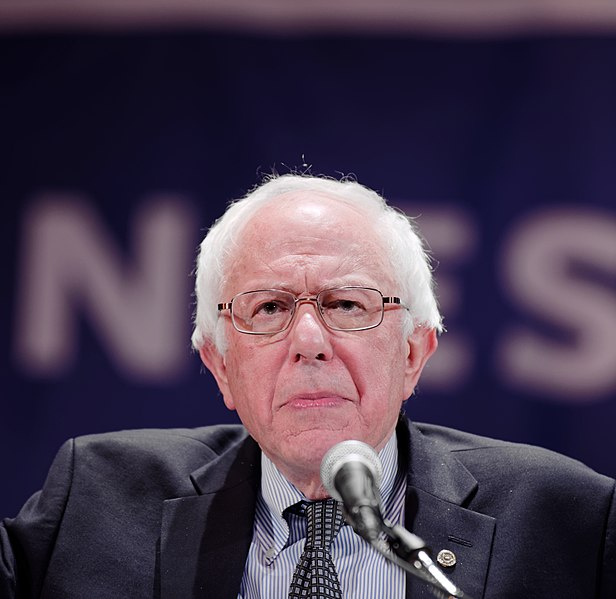
I’ve said it before, and I’ll say it again: Senator Bernie Sanders remains a top-three candidate despite his average debate performances. The Vermont senator suffered a heart attack last month, postponing all campaign events until further notice. He also lost his daughter in law to cancer. It’s a godsend that he is still participating in the debate, and a testament to his dedication to public service.
Since September, the Vermont senator has released a plan aimed at combating corruption in business and empowering workers. Dubbed “Corporate Accountability and Democracy”, Sanders’ plan proposes giving corporate employees 20% of company shares (two percent a year until they reach this amount) and 45% of seats on the board of directors. This would mostly affect either publicly traded companies or those with at least $100 million in annual revenue. It also proposes raising the corporate tax rate from 21% back to the pre-Tax Cuts and Jobs Act rate of 35%.
Tom Steyer (1.4%)
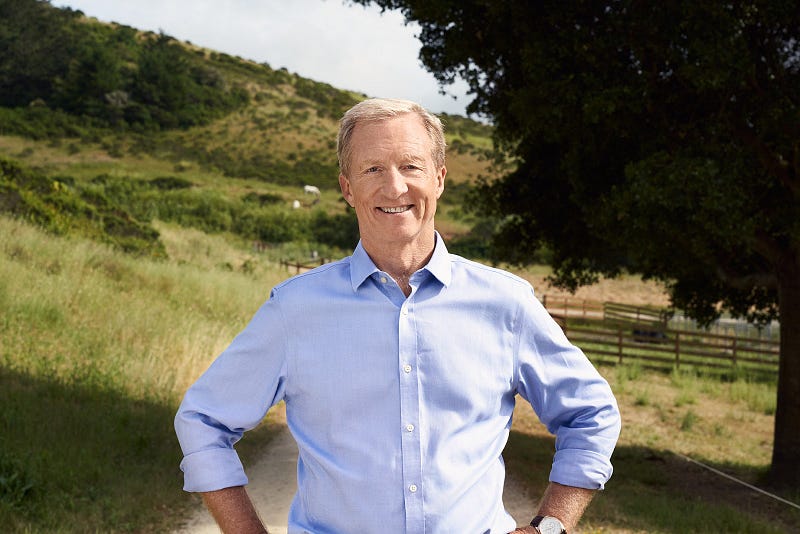
Billionaire entrepreneur and philanthropist Tom Steyer of New York, New York, entered the race in July 2019 between the first and second rounds of Democratic debates. A Yale alumnus, Steyer has also previously founded hedge fund company Farallon Capital, alternative energy PAC NextGen America, and Need to Impeach, a PAC specifically devoted to impeaching Donald Trump. He resigned from the former in 2012, and from the latter two in order to run for president. This is his first time qualifying for a debate.
Per his website, Steyer wants to reform our electoral process (repeal Citizens United, congressional term limits, Vote At Home system), supports a $15 minimum wage, and supports “free, quality, public education from preschool through college and on to skills training.”He is a staunch advocate for climate change, having previously founded NextGen America. Per The Atlantic, he was a supporter of Governor Jay Inslee’s extensive climate agenda. He has been critical of President Trump and Vice President Mike Pence on immigration and LGBTQ+ rights, respectively. The Yale alumnus has also committed to combating big business, saying in his initial announcement that “the only way for us to solve the urgent problems facing our country is to loosen the stranglehold that corporations have over our politicians and return political power to the American people.”
Notwithstanding, Steyer will be open to criticism of his previous investments in companies and other projects that will raise carbon emissions. He’s also a billionaire, which may not play well in a race where the front-runners are taking aim at the wealthy and campaigning against an incumbent billionaire president.
Elizabeth Warren (23.4%)
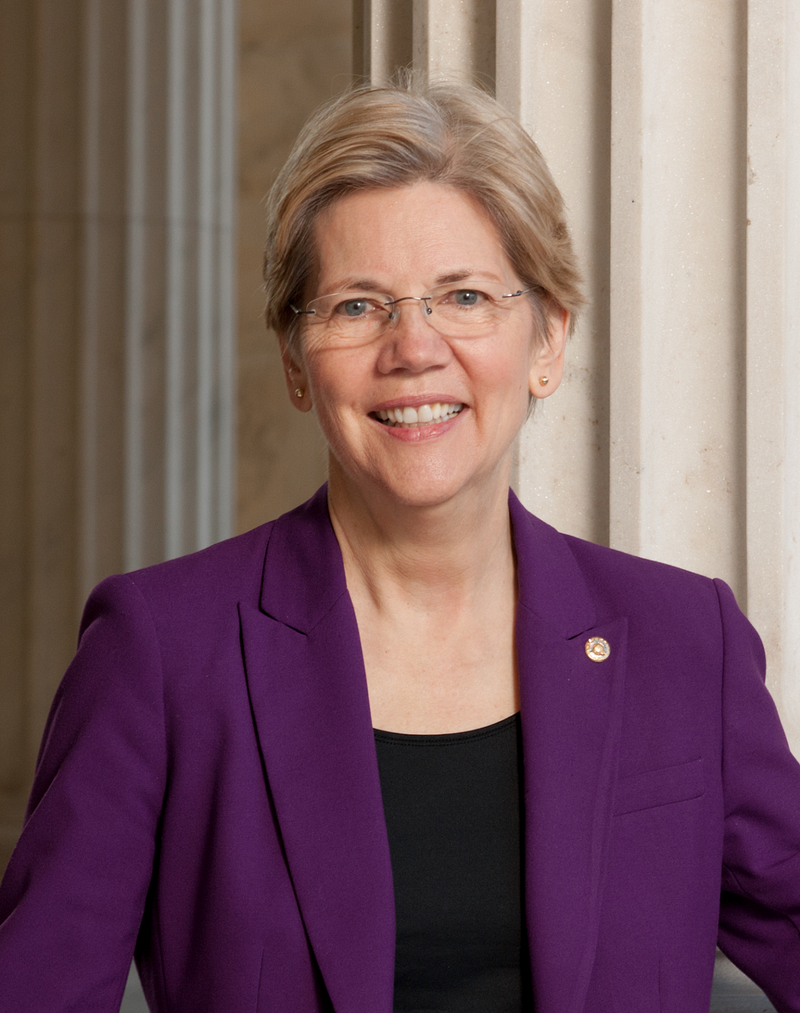
Senator Warren has been campaigning extremely well. For a brief moment, she had taken a slight polling lead over Vice President Biden. She’s been a consistently strong debate presence. It has been admittedly difficult to critique her outside of policy positions, but she is a fierce advocate for her perspective. This may serve her well in the long run. Only time will tell.
Since September, the Massachusetts senator has unveiled an “environmental justice” plan. Warren proposes the creation of a Council on Climate Action, restoring previous funding to the Environmental Protection Agency (EPA), and shifting the EPA’s National Environmental Justice Advisory Council to report directly to the White House. All federal agencies would be required to take climate into consideration when making decisions.
Andrew Yang (2.4%)
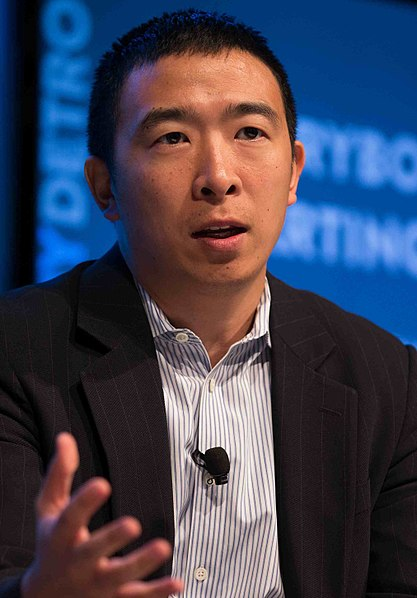
Andrew Yang is still a fascinating candidate. With very little political experience, he remains a top-ten candidate and improved his fundraising in the third quarter of 2019 from $2.8 million to $10 million. He’s been critical of his colleagues and President Trump alike. He’s been showing off his basketball skills! Yang has been successfully raising his profile, and it may benefit him as more candidates drop before Iowa.
After announcing a pilot program for his “Freedom Dividend” during the September debate, the entrepreneur has not released any new policy agendas of note. He has, however, qualified for the November debate, being one of only eight candidates so far to do so out of the remaining 19.
How do you feel about the candidates? Be sure to watch tonight’s debate to see how they do! Tune in to nytimes.com, The New York Times app, CNN, CNN International, CNN en Español or CNN.com from 8 to 11 PM!
Want to keep up with PubSquare? Follow us on Twitter and Instagram!
Want to keep up with The RYM? Like us on Facebook, follow us on Twitter, follow us on Instagram, or join our mailing list below!



